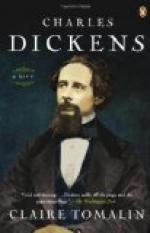as a keepsake. This pleasant land he left for
a dingy house in a dingy London suburb, with squalor
for companionship, no teaching but the teaching of
the streets, and all around and above him the depressing
hideous atmosphere of debt. With what inimitable
humour and pathos has he told the story of these darkest
days! Substitute John Dickens for Mr. Micawber,
and Mrs. Dickens for Mrs. Micawber, and make David
Copperfield a son of Mr. Micawber, a kind of elder
Wilkins, and let little Charles Dickens be that son—and
then you will have a record, true in every essential
respect, of the child’s life at this period.
“Poor Mrs. Micawber! she said she had tried
to exert herself; and so, I have no doubt, she had.
The centre of the street door was perfectly covered
with a great brass-plate, on which was engraved ’Mrs.
Micawber’s Boarding Establishment for Young
Ladies;’ but I never found that any young lady
had ever been to school there; or that any young lady
ever came, or proposed to come; or that the least
preparation was ever made to receive any young lady.
The only visitors I ever saw or heard of were creditors.
They used to come at all hours, and some of
them were quite ferocious.” Even such a
plate, bearing the inscription,
Mrs. Dickens’s
Establishment, ornamented the door of a house in
Gower Street North, where the family had hoped, by
some desperate effort, to retrieve its ruined fortunes.
Even so did the pupils refuse the educational advantages
offered to them, though little Charles went from door
to door in the neighbourhood, carrying hither and thither
the most alluring circulars. Even thus was the
place besieged by assiduous and angry duns. And
when, in the ordinary course of such sad stories,
Mr. Dickens is arrested for debt, and carried off to
the Marshalsea prison,[2] he moralizes over the event
in precisely the same strain as Mr. Micawber, using,
indeed, the very same words, and calls on his son,
with many tears, “to take warning by the Marshalsea,
and to observe that if a man had twenty pounds a year,
and spent nineteen pounds nineteen shillings and sixpence,
he would be happy; but that a shilling spent the other
way would make him wretched.”
The son was taking note of other things besides these
moral apothegms, and reproduced, in after days, with
a quite marvellous detail and fidelity, all the incidents
of his father’s incarceration. Probably,
too, he was beginning, as children will, almost unconsciously,
to form some estimate of his father’s character.
And a very queer study in human nature that
must have been, giving Dickens, when once he had mastered
it, a most exceptional insight into the ways of impecuniosity.
Charles Lamb, as we all remember, divided mankind into
two races, the mighty race of the borrowers, and the
mean race of the lenders; and expatiated, with a whimsical
and charming eloquence, upon the greatness of one
Bigod, who had been as a king among those who by process
of loan obtain possession of other people’s money.




